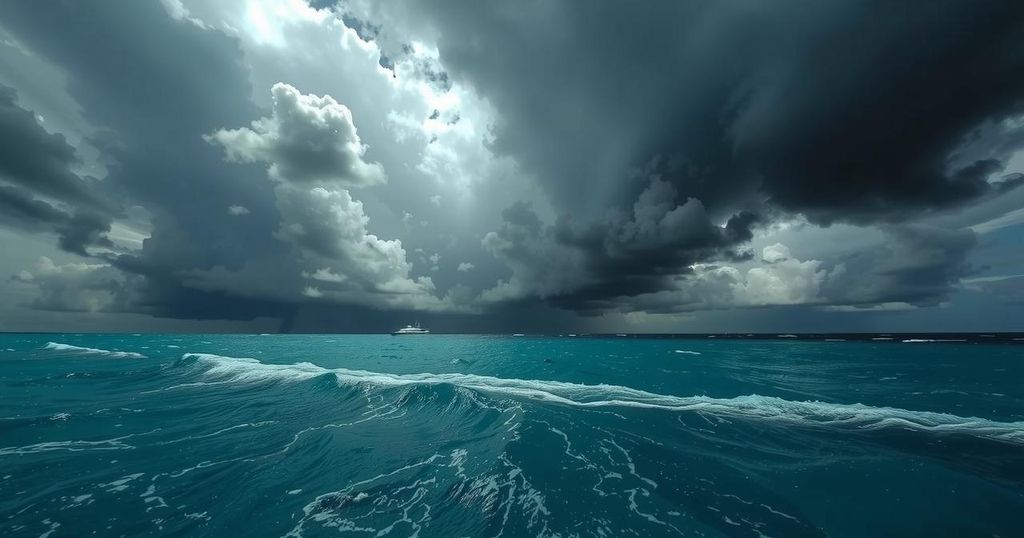Tropical Storm Oscar moved toward the Bahamas after striking Cuba as a Category 1 hurricane, resulting in at least six deaths due to extensive rainfall. It is noted for being the smallest recorded hurricane, causing significant flooding and impacting recovery efforts in Cuba, which is dealing with a power outage. Meteorologists predict more storms could develop as the hurricane season progresses.
Tropical Storm Oscar moved towards the Bahamas on Tuesday following its impact on Cuba as a Category 1 hurricane, leading to the unfortunate loss of at least six lives. This storm brought substantial rainfall to the region, compounding challenges in Cuba, which was already grappling with a significant power outage. As of Tuesday morning, Oscar was recorded approximately 70 miles (110 kilometers) east-southeast of Long Island in the Bahamas, exhibiting maximum sustained winds of 40 mph (65 kph) while proceeding northeast at 12 mph (19 kph), as reported by the National Hurricane Center in Miami. The storm is predicted to deposit up to 4 inches (10 centimeters) of rain across the southeastern Bahamas and the Turks and Caicos Islands, prompting a tropical storm warning for the southeastern region. Notably, Oscar has been documented as the smallest hurricane on record, with a wind field encompassing only about 6 miles (10 kilometers). It unexpectedly intensified into a hurricane upon making landfall on Grand Inagua Island in the Bahamas on Saturday and subsequently did so again in eastern Cuba late Sunday before reversing direction back to the Bahamas. Michael Lowry, a specialist in hurricanes and storm surges, noted the unpredicted nature of the storm, stating, “It’s not often we see a colossal failure in hurricane forecasting,” highlighting that no forecasting models had anticipated Oscar’s strengthening into hurricane status. The storm resulted in over 15 inches (38 centimeters) of rainfall in several locations in eastern Cuba, with warnings issued regarding severe flooding and potential landslides. The fatalities were reported in Guantánamo. Oscar’s arrival coincided with Cuba’s efforts to recover from a substantial blackout, an event that had incited minor protests and elicited stern warnings from the government against any form of unrest. Moreover, Oscar stands as the 15th named storm and 10th hurricane of the Atlantic hurricane season, which extends from June 1 to November 30. Long-range meteorological models suggest that another storm may form in the central Caribbean within the next week. Mr. Lowry contemplated, “One last gasp may be in store for the Atlantic as we turn the calendar to November.” The National Oceanic and Atmospheric Administration has predicted an above-average Atlantic hurricane season this year, attributing this forecast to unprecedented ocean temperature levels, estimating a range of 17 to 25 named storms and four to seven major hurricanes of Category 3 or higher prior to the season’s conclusion. Additionally, Tropical Storm Kristy was observed in the Pacific Ocean, located approximately 470 miles (755 kilometers) west-southwest of Acapulco, Mexico, with sustained winds of 60 mph (95 kph) and moving westward at 16 mph (26 kph) with expectations of further strengthening into a hurricane by Tuesday night.
The Atlantic hurricane season, spanning from June 1 to November 30, has witnessed an increase in storm activity this year, primarily due to heightened ocean temperatures. The National Oceanic and Atmospheric Administration (NOAA) has projected that the season will experience an above-average number of storms, which includes both named storms and hurricanes of varying intensities. Tropical Storm Oscar stands out due to its unforeseen development into a hurricane and its historical record as the smallest hurricane. Furthermore, the socio-political context in Cuba, marked by power outages and civil discontent, significantly influences the impact of such natural disasters. Such storms raise concerns about public safety, infrastructure integrity, and emergency response capabilities across affected regions.
In summary, Tropical Storm Oscar has significantly impacted the Bahamas and Cuba, causing substantial rainfall and fatalities. The unexpected intensification into a hurricane has drawn attention to forecasting efforts within meteorology. As the hurricane season progresses, the potential for further storms looms, underscoring the importance of vigilance and preparedness in affected regions. The broader implications of these weather patterns, influenced by ocean temperatures, elevate concerns regarding climate variability and its effects on disaster response and recovery.
Original Source: gazette.com







